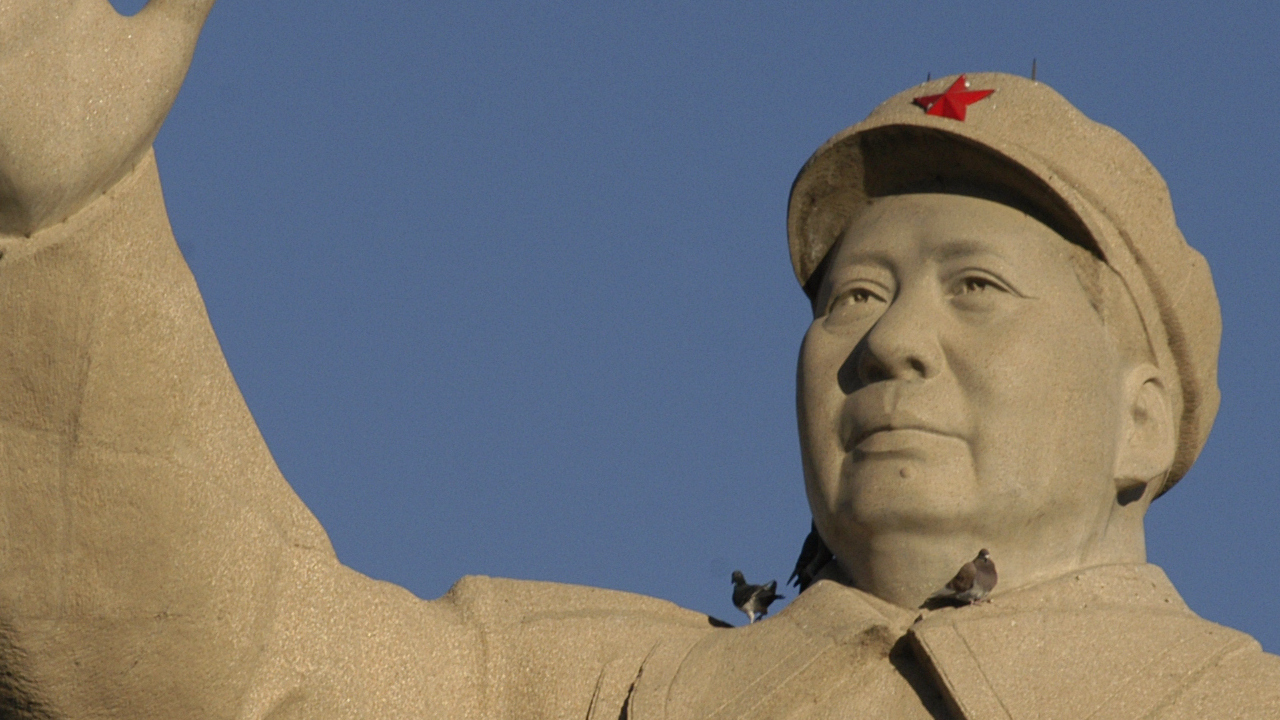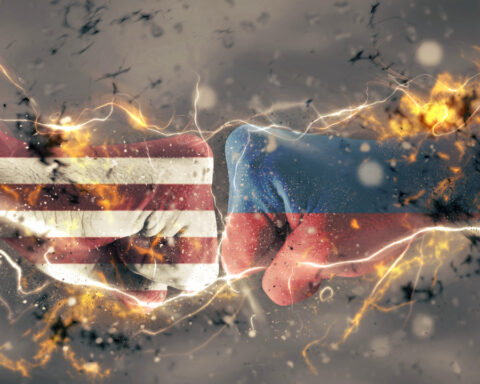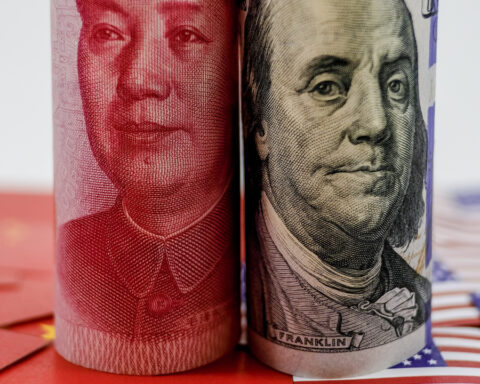Following the Sino-Soviet Split, the USSR quickly entered a period of economic decline under the tenure of a new Soviet regime. Leonid Brezhnev succeeded Khrushchev as First Secretary of the Communist Party in 1964, primarily due to Khrushchev’s failure to effectively implement policy surrounding economic growth and his perceived mishandling of the Cuban Missile Crisis. Contrary to Khrushchev’s generally autocratic method of ruling, Brezhnev partnered with a number of veteran CPSU officials to rule the USSR collectively. The primary members of this cabal included Alexei Kosygin, Nikolai Podgorny, Andrei Kirilenko, and Mikhkail Suslov, who were Premier, Chairman of the Presidium, General Secretary, and Chief Ideologue, respectively (Tompson, 2014). Early on, Kosygin was seen as the dominant policy maker, attempting to implement reforms throughout the 1960’s to counter the economic downturn that Khrushchev had enabled. When these early attempts towards marketization produced no impact, Brezhnev seized upon Kosygin’s failure to become the dominant voice of the Party. Tompson writes, “Increasingly, Brezhnev emerged as the new ‘public face’ of the regime, both at home and abroad. While the Brezhnev cult did not really take off until about 1977, his public profile at home was markedly higher than that of any other member of leadership” (Tompson, 2014, p. 16).
The 1970s quickly became dubbed the “Era of Stagnation,” due to the continued economic deterioration Soviet leadership was unable to counter. The chief cause of this was a vastly overcentralized economy and bureaucracy, which corresponded to a widespread decrease in labor productivity, low levels of technological innovation, and substantial political corruption (Tompson, 2014). This period was also characterized by a significant military buildup, which attempted to put the USSR on equal footing with the United States. The USSR became embroiled in a costly war in Afghanistan, as well as the continued nuclear arms race with the United States. Yet, unlike the United States, the Soviet Union did not have nearly enough resources to sustain such a buildup, and often sacrificed domestic economic and social objectives to ramp up defense spending – particularly throughout the Soviet invasion of Afghanistan. As the economic situation worsened, the Soviet leadership began to fracture in the late 1970s. By this point, the Soviet leadership had begun to resemble a gerontocracy, with its leading members being significantly older than the rest of the population. Writing about this problem, Tompson explains, “Personnel turnover in top party and state bodies declined dramatically, with the result that the country’s political elite aged steadily. This both reduced the scope for introducing new people – and hence new ideas – into the leadership and created greater opportunities for corruption than had previously existed” (Tompson, 2014, p. 22).
Brezhnev continued to gain popularity and consolidate his power, and his rivals began to fall one by one. Podgorny, Chairman of the Presidium (head of state), had begun to amass too much influence for Brezhnev’s comfort; Brezhnev forced him out with the help of his ally Konstantin Chernenko in 1977. Alexei Kosygin was next. In 1980, he was pressured to resign due to his declining influence, and died shortly thereafter. Suslov, widely considered Brezhnev’s most powerful ally, had a massive heart attack and died in January of 1982. Kirilenko also had a heart attack in mid-1982, and was forced from power by the growing influence of the KGB spymaster, Yuri Andropov, who had begun to jockey for the inevitable position of power that would be vacated upon Brezhnev’s death. All the while, the Central Committee of the Communist Party continued to age – over half of them had reached adulthood on or before the year 1937 (Tompson, 2014).
When Brezhnev’s health finally failed him on November 10, 1982, the USSR was left with a leadership vacuum. Because Brezhnev had been nearly senile in his old age, and his allies were increasingly feeble or dead, it increasingly had fallen to the KGB to keep the Soviet Union running (Glazov, 1983). By mid-1982, KGB Director Andropov had amassed power previously unheard of for a spymaster. Andropov’s main rival for succeeding the ailing Brezhnev was Konstantin Chernenko, though Andropov successfully leveraged his power and influence to become the new General Secretary, and undisputed leader of the Soviet Union upon Brezhnev’s death. Writing of Andropov shortly after his ascension, Yuri Glazov expounds, “Andropov is a relatively new phenomenon at the summit of Soviet power. His intelligence matches his iron efficiency. His virtuosity in schemes and intrigues parallels his ruthless firmness. He desires to bring a new style to the ruling mechanism… the three-fold official campaign against corruption, sloppiness in work, and Russian unbounded drunkenness has been mounted to such an extent that the word ‘order’ is now associated with Andropov” (Glazov, 1983, p. 213). Andropov not only assumed leadership of the Party, but also of the Soviet state, seizing the post of Chairman of the Supreme Soviet. One area that had become increasingly problematic, which Andropov attempted to address from the outset, was the increasing division between the central Russian state and the outlying republics. Martha Brill Olcott wrote at the time, “The political implications of the multi-national state remain as a challenge to Andropov’s successors. The Baltic republics and the Ukraine remain potentially politically unstable, and are areas where both dissenters and the general population have been especially alert to developments in neighboring Poland” (Olcott, 1985, p. 115). This would become a major problem for the Soviet Union later in the decade. Yet, like most of the CPSU leadership at the time, Andropov was old, and beginning to show signs of infirmity at the age of 68 when he took power. While he tried to rejuvenate the stagnating Soviet Union, he would not have the chance to implement his policies before he died.
When Andropov did eventually succumb to illness in February of 1984, it was Konstantin Chernenko – Andropov’s one-time rival – who succeeded him. Archie Brown humorously remarks that this was a strange decision by the Politburo, because “to succeed a man who had tried to breathe new life into the Soviet system but whose own health had taken a fateful downward turn within months of his coming to the General Secretaryship, they selected an even older man who has within the past year or so been less robustly healthy than he appeared to be in the 1970s and who was, furthermore, exceptionally closely identified with Leonid Brezhnev’s style of rule, from which Yuri Andropov had been making an effort to depart” (Brown, 1984, p. 134). Andropov had been grooming the relatively young Mikhail Gorbachev to succeed him, but the Politburo – made up of mostly old men – believed Gorbachev to be too young for the responsibility (Brown, 1984). That said, it was clear at this point that Gorbachev had become the second most powerful man in the Soviet Union, more due to lack of competition and the amount of Soviet leaders who had recently died than any other reason (Brown, 1984). So, when Chernenko promptly died within a year of taking the reins, Gorbachev ascended.
Photo by Tanukiphoto, GettyImages.
Jack McPherrin is the managing editor of 1818 Magazine. Jack works as the research editor for the Editorial Department of The Heartland Institute, where he also contributes to the mission of the Socialism Research Center as a research fellow. He is in the final stages of completing his Master’s Degree in International Affairs from Loyola University-Chicago, where his myriad research interests primarily encompass domestic and international economic policy, global institutions, authoritarian regimes, and foreign affairs - with a particular emphasis upon Russia and China. Prior to his graduate pursuits, Jack spent six years in the private sector after graduating from Boston College with a dual Bachelor's Degree in Economics and History. He currently resides in the Lincoln Park neighborhood of Chicago, a few short miles from where he was raised.






